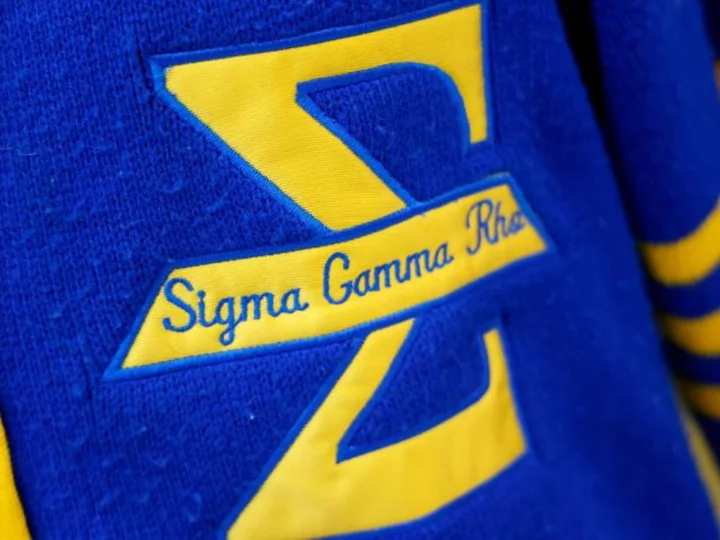A Nashville teacher made headlines this month for removing a White elementary student's shirt because it was emblazoned with the letters of her historically Black sorority.
A spokesperson for Metro Nashville Public Schools told CNN the sorority shirt violated McGavock Elementary School dress code "due to having writing," but stressed that it should not have been exchanged for a school uniform polo without parental permission.
"The school will follow the district's employee relations process and counsel the staff member on appropriate conduct in these regards," the spokesperson told CNN.
The incident has since sparked a conversation online about why the teacher had such an intense reaction to the child wearing her sorority's letters -- and whether this behavior should be praised or condemned.
While many members of the nine Black Greek-letter organizations -- known collectively as the Divine Nine -- did not support the teacher's actions, some members said they understood the passion that drove her reaction.
Lawrence Ross, author of "The Divine Nine: The History of African American Fraternities and Sororities," told CNN more than a century of history, dedication and service makes members fiercely protective of who is allowed to represent a fraternity or sorority by wearing their letters.
Ross, who himself is a member of Alpha Phi Alpha Fraternity, Inc., a Divine Nine organization, said in his opinion there's a difference in a young girl wearing a shirt because she likes the signature pink and green colors of Alpha Kappa Alpha Sorority, Inc., and an adult who wears the letters knowing they are not a member.
"For those people who say, 'Eh, that's just (a shirt), it doesn't really matter' they also don't really believe or understand (Black Greek) fraternity and sorority life," he said.
A legacy grounded in activism
Many Divine Nine sororities and fraternities were founded in the early 20th century during a time when racism and discrimination against Black Americans was pervasive.
In the early 1900s, after Black Americans graduated from Freedmen's Schools -- founded after the abolition of slavery to teach children as well as adults -- and other religious educational institutions, Ross said people of color began enrolling in college to obtain better education and economic opportunities.
At the time, he said, White fraternities and sororities often had restrictive racial clauses in their constitutions that would not allow Black Americans and other people of color to join their organizations.
So, Black students founded their own fraternal organizations that reflected their culture and lived experiences.
The organizations that form the Divine Nine are:
Alpha Phi Alpha Fraternity, Inc., founded in 1906Alpha Kappa Alpha Sorority, Inc., founded in 1908 Kappa Alpha Psi Fraternity, Inc., founded in 1911Omega Psi Phi Fraternity, Inc., founded in 1911Delta Sigma Theta Sorority, Inc., founded in 1913Phi Beta Sigma Fraternity, Inc., founded in 1914Zeta Phi Beta Sorority, Inc., founded in 1920Sigma Gamma Rho Sorority, Inc., founded in 1922Iota Phi Theta Fraternity, Inc., founded in 1963
Throughout their history, membership in the Divine Nine organizations was not only about enhancing the collegiate experience, but also uplifting the Black community.
Divine Nine founders and earliest members placed themselves at the forefront of critical issues in America, such as voting rights, racial justice and equal education, Ross said.
Nearly two months after Delta Sigma Theta Sorority, Inc., was founded on January 13, 1913, the sorority participated in the Woman Suffrage March in Washington, DC.
Prominent civil rights leaders, including Martin Luther King, Jr., and W.E.B. Du Bois -- both members of Alpha Phi Alpha Fraternity, Inc. -- lead the movement for racial justice in the United States.
Today, the Divine Nine organizations boast hundreds of chapters across the US and around the world. Traditions such as stepping, which is a blend of African traditional movements and American dance styles, are often associated with Divine Nine organizations.
But they have also maintained their commitment to philanthropy and service through scholarships, community service and programs to develop their members personally and professionally.
"We're usually the first people that people turn to for help," Ross said, adding that Divine Nine organizations play a central role in the Black community and often provide mentorship and guidance to the next generation.
There is also an exclusivity of who adorns the letters, the organizations say. To even be considered for membership, there are certain academic and community service requirements that must be met along with commitment to upholding moral character.
"It's a big deal," Ross said. "There's a level of dedication that goes with becoming a member ... You're pledging yourself to work on behalf of your community with those representing something larger than yourself. And it takes a lot of hard work and sacrifice to do so."
The importance traditions and paraphernalia
Black Greek-letter organizations distinguish themselves with colors, calls and letters. And, as a show of pride and to signify their membership, those in the organizations wear clothing and items bearing their Greek symbols also known as "paraphernalia."
Ross told CNN it is even included in the organizations' protocols that their paraphernalia is only to be worn by duly initiated members and there are rules around when and where to be dressed in the letters.
According to CNN affiliate WTVF, the Nashville teacher at the center of controversy around the second grade student's AKA t-shirt, also sent an email to the child's mom explaining that, "AKA branded items are trademarked and reserved for members only."
While some Divine Nine members on social media said they understood the teacher's actions because the child should not have been wearing the shirt, others disagreed and said the teacher went a step too far by removing a 7-year-old's clothes.
Other recent incidents of people who are not members wearing paraphernalia or using hand signs have also sparked anger and backlash among some members.
Actress Amanda Seales faced criticism in 2021 for wearing the AKA letters in an episode of the television series "Insecure." Though her character was described as a member of the organization, Seales was criticized by some on social media for wearing the sorority's letters because she herself was not a member.
Rapper Boosie BadAzz has also faced online backlash for wearing Kappa Alpha Psi Fraternity, Inc., paraphernalia and apologized in 2020 after he posted pictures in the fraternity's t-shirt.
Traditions rooted in African and Black culture
Ross encourages people to research and learn more about Divine Nine sorority and fraternity culture. But, he said, once a person is aware, they should be respectful of the organizations' cultures and traditions.
"All of these things are culturally relevant, you should listen to understand," he said. "You can't understand what our devotion is and has been in the Black community ... without understanding the Divine Nine."
For Divine Nine sororities and fraternities, membership doesn't end once a person graduates from college, it can be extended through graduate school chapters and lasts for a lifetime.
"Membership continues because that's our connection to our greater goal," Ross said. "We can't afford a localized college experience. Our college experience has to be able to go back into the community, has to go back into our family, has to go back and lift the people who were not able to go to college or aspire to go to college, or their kids aspire to go to college."
Some of the organizations also extend honorary membership to those who have excelled significantly in their careers or made notable contributions to society. In July, US Supreme Court Justice Ketanji Brown Jackson became an honorary member of Delta Sigma Theta Sorority, Inc.
Together, members celebrate each other's milestones, such as graduations and weddings, with songs and chants. Members are also eulogized in memorial services after their death.
"The lifelong bond is built through lifelong service," Ross said. "We are in the experience business and because we all have experiences that impact our lives, that bond never goes away."
Disclaimer: Chandelis Duster is a member of Delta Sigma Theta Sorority, Inc.









